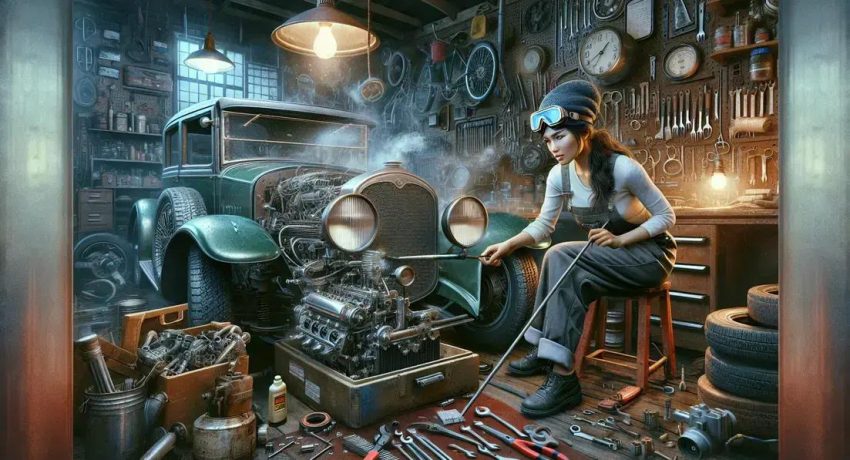Fix your car yourself by addressing common issues like flat tires, dead batteries, and worn brake pads using essential tools and straightforward DIY methods to save money and gain confidence in car maintenance.
Fix your car yourself and take control of your vehicle’s maintenance! Have you ever wondered how much money you could save by tackling simple repairs on your own? Let’s dive into how you can start making those repairs without needing to visit a mechanic.
Table of Contents
ToggleEssential tools for DIY car repairs

When you decide to fix your car yourself, having the right tools is crucial. Here’s a list of essential tools that every DIY mechanic should have:
1. Basic Hand Tools
A good set of hand tools includes a variety of wrenches, screwdrivers, and pliers. These basics will help you manage most small repairs and adjustments with ease.
2. Torque Wrench
A torque wrench is essential for ensuring that bolts are tightened to the correct specifications, preventing damage to your vehicle.
3. Jack and Jack Stands
A reliable jack allows you to lift your car safely, while jack stands provide stability while you work underneath. This combination is essential for any major repairs.
4. Diagnostic Scanner
A diagnostic scanner can help you read error codes from your car’s computer system. This tool is invaluable for troubleshooting modern vehicles.
5. Oil Filter Wrench
When it’s time for an oil change, an oil filter wrench makes removing the old filter much easier. It’s an inexpensive tool that pays off over time.
6. Shop Manual
A shop manual specific to your car model can be a great reference, providing detailed instructions on repairs and maintenance tasks.
With these tools at your disposal, you can confidently tackle common car issues and save money on repairs. Remember, starting small and practicing on simple tasks can build your skills and confidence.
Common car issues you can fix yourself

When it comes to maintaining your vehicle, knowing some common car issues that you can fix yourself is invaluable. Here are a few problems that often arise and easy solutions for each:
1. Flat Tire
A flat tire is one of the most common issues. You can quickly fix it by using a spare tire or a tire repair kit. Always check your tire pressure regularly to avoid issues.
2. Dead Battery
If your car won’t start, it might be due to a dead battery. Consider using jumper cables to jump-start your vehicle, or replace the battery if it’s old.
3. Overheating Engine
If your engine overheats, check the coolant level first. You may need to add more coolant or inspect for leaks. Always allow the engine to cool before opening the cap.
4. Worn Brake Pads
Squeaking or grinding noises from your brakes may indicate worn brake pads. Replacing brake pads is a serviceable job with the right tools and some guidance.
5. Noisy Exhaust
A noisy exhaust can point to a leak in the exhaust system. You can look for rust or holes, and in some cases, use a patch to fix small holes temporarily.
These issues are common and can be resolved through DIY methods, saving you time and money. However, always prioritize safety and consult a professional if you’re unsure about any repairs.
In summary, empowering yourself to fix your car
Being able to fix your car yourself can save you money and give you confidence in handling basic repairs. With the right tools and knowledge, many common car problems are manageable.
From changing a flat tire to jump-starting a dead battery, these skills can make a big difference. Remember, it’s essential to stay safe and seek help when needed.
Embracing DIY car repairs not only helps you save money but also builds your skills and independence as a car owner.
FAQ – Common Car Issues You Can Fix Yourself
What are some common car issues I can fix myself?
Common car issues include flat tires, dead batteries, overheating engines, worn brake pads, and noisy exhaust systems.
How do I change a flat tire?
To change a flat tire, use a jack to lift the vehicle, remove the lug nuts, replace the tire with the spare, and tighten the lug nuts securely.
What tools do I need for DIY car repairs?
Essential tools include basic hand tools like wrenches and screwdrivers, a torque wrench, a jack, and a diagnostic scanner.
Can I change my car’s brake pads on my own?
Yes, changing brake pads can be done at home with the right tools and following a guide specific to your car model.
When should I seek professional help for car repairs?
You should seek professional help if you’re unsure about the repair process, if the issue is complex, or if safety is a concern.
How can I prevent common car issues from happening?
Regular maintenance such as checking tire pressure, changing oil, and inspecting belts and hoses can help prevent many common car problems.






